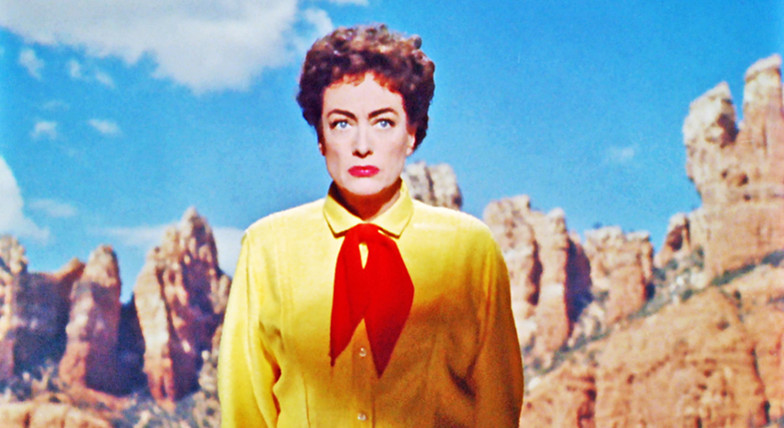
“Johnny Guitar is surely one of the most blatant psychosexual melodramas ever to disguise itself in that most commodious of genres, the Western.”
– Roger Ebert
Anyone can play guitar
“I’m gonna kill you,” spits a venomous Emma Small, played with evil élan by Mercedes McCambridge, to the legendary Joan Crawford (Forsaking All Others, Mildred Pierce) as Vienna—in a full blast conquering turn as a saloon proprietress in the centre of a cyclone of misgivings and bad blood in an Arizona cattle town. “I know,” she gamely quips,”if I don’t kill you first.”
Their dealing is amidst several armed deputies and town folk eager to mete out frontier justice over a stagecoach robbery, with a controversial railroad project, a murder, and whispers of a long-since doomed love triangle all feeding into a fire of ferment and jealous suspicion that will likely reduce many to ashes.
All this is only the flying-start to Nicholas Ray’s (In A Lonely Place, Rebel Without a Cause) avant-garde and oft-maligned revisionist Western from 1954, the singularly strange and impossibly cool Johnny Guitar.
The two women, bête noire dames in an ancillary reversal of gender archetypes, abandon the typical Western forecast in roles heretofore deemed solely by men—as hero and villain—just one of many volte-face deviations in Ray’s misunderstood masterpiece.
Vienna and Mercedes are to-the-death antagonists who, at a time prior to our story’s telling, shared a lover, the Dancin’ Kid, played by veteran tough guy cowboy actor Scott Brady (Canon City, He Walked By Night).
There’s another inamorato gunslinger in the film, too, Sterling Hayden (Dr. Strangelove, The Godfather) as the eponymous Johnny “Guitar” Logan, and like his opposite number, Dancin’ Kid, these dominator male figures are little more than commodities; objects of female fancy in another annulment of societal norms, these recognizable leading men here are merely decoration.
Sterling’s character lends the film his moniker, true, but for mostly poetic reasons. He was once Vienna’s beau and still, for regretful reasons perhaps, remains close to her seemingly impenetrable heart.
“Johnny Guitar is the Beauty and the Beast of Westerns, a Western dream. The cowboys vanish and die with the grace of ballerinas. The bold violent colour contributes to the sense of strangeness; the hues are vivid, sometimes very beautiful, always unexpected.”
– François Truffaut
Johnny-come-lately
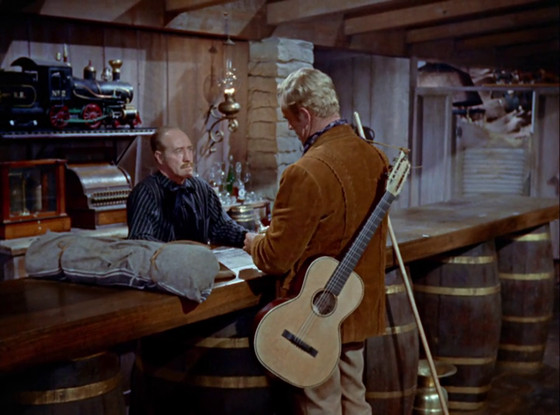
Tragically typical of American moviegoers and critics at the time, Ray’s adventurous and impudently styled film, also his first in colour, caused confusion and perplexity in a genre where no such suggestions and designs previously existed.
The dithering bombast that resulted, coming across like braggadocio to old-fashioned audiences, sidelined its release in North America, bidding bad reviews and negative criticism, which effectively crippled it.
But in France the Cahiers du Cinéma critics, soon to become the French New Wave, championed the film, immediately recognizing it as the work of an auteur, possessing both perception and ability. “He is the poet of nightfall,” raved Truffaut of Ray, “and of course everything is permitted in Hollywood except for poetry.”
“[Johnny Guitar] is an intense, stylized, unconventional picture full of ambiguities and subtext that render it extremely modern.”
– Martin Scorsese
This must be the place
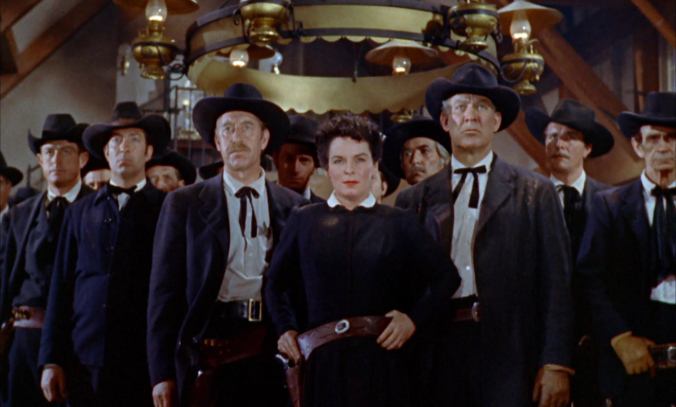
While initial reactions in 1954 nearly wrote off Johnny Guitar completely, save for the haunting and elegiac title song by Peggy Lee, which became a huge hit, Johhny Guitar went largely unnoticed in North America and so Ray lost himself in production of his next movie, a James Cagney vehicle, Run for Cover.
A much more straight-ahead Western, Run for Cover was a box-office hit, by today’s standards a pretty rudimentary though rewarding film (Cagney never disappoints in anything), and this was followed directly by the film Ray is probably best known for, Rebel Without A Cause (like Run for Cover, also released in 1955).
Perhaps it was Rebel’s rich reception that helped with reappraisals of Johnny Guitar, which began to outwardly effervesce as Rebel received accolades, eventually and rightfully restoring Johnny Guitar to the upper echelons of Ray’s work.
As the French New Wave grew to international acclaim in the late 1950s, so to did their declarations and impressions of the filmmakers who stirred and started them most, Ray chiefly amongst them.
For myself, a very early recollection and introduction to Johnny Guitar came from Truffaut’s 1969 drama, Mississippi Mermaid when the dazzling Catherine Deneuve and bad boy Jean-Paul Belmondo see the film and discuss it’s merits while on the run from the law.
Modern masters like Pedro Almodóvar, Shinji Aoyama, Jim Jarmusch, and Martin Scorsese regularly site the film as a prized motion picture, a misunderstood but nonetheless marvellous cinematic emprise, and bottomless well of illumination and enlightened ideas.
“Johnny Guitar is the only movie that I‘d like to remake someday, although I know that it’s impossible. It’s probably closest to the worst nightmare I can have. I know for sure that my desire to remake this movie comes from my warped thought that I want to remake my own nightmare.”
– Shinji Aoyama, director (Desert Moon, Eureka)
Captured in Trucolor—a now outmoded process that gives colors a superbly plastic presentation—the film is domineered, almost oppressively so, by greens and reds. Ray orchestrated the picture so as to mine the narrative and dramatic potential of these colours, giving the characters almost maudlin tones and shades, drawing a very theatrical line of leitmotifs to be read into, if so inclined.
So many sequences in the film indicate Ray’s well-pressed visual compositions, his emotional augury and chill foreshadowing. Vienna, adorned in virginal whites, seated at her piano in her emptied, cavernous saloon, a blazing orange backdrop, typifies this perfectly, or Emma, adorned in funeral clothes, face braided with hate, gun drawn on the man she cannot espouse, framed in colours like electric Kool-Aid.
So many other dream-like visages spring to mind, too, but I’m not wanting to issue any spoilers to those who haven’t marvelled at Johnny Guitar’s sideways gaze and nonstop parade of visual rhymes and trickily articulated elegance.
“Love and hate, prostitution and frustration, domination and humiliation are woven into a hypnotic Freudian web of shifting relationships, illuminated by the director’s precise, symbolic use of colour, and strung together with an unerring sense of pace. The whole thing is weird, hysterical, and quite unlike anything else in the history of the cowboy film: where else can one find a long-expected shootout between two fast and easy killers averted by a woman’s insistence that they help her prepare breakfast?”
– Geoff Andrew, Time Out
Push the sky away
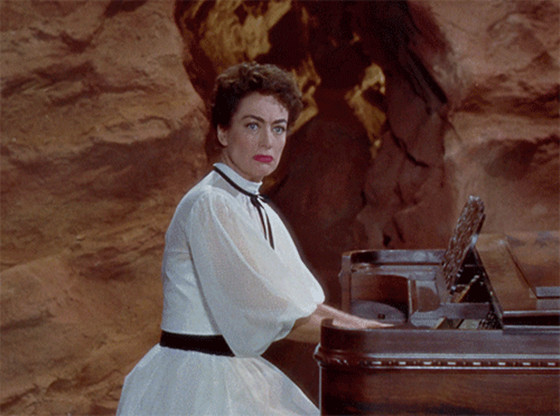
Joan Crawford’s defiant, engaging, and altogether odd performance cannot be undervalued in any analysis of the film. While the cast is uniformly strong and populated by a rogues gallery of outlaws (Ernest Borgnine as Bart Lonergan is agent provocateur instantly), put upon lawmen (Frank Ferguson’s Marshal Williams is a patsy straight away), and an elaborately off the mark malefactor in the aforementioned Emma Small, but it’s Crawford who makes us care and whose tensions have us spellbound and beguiled.
As Vienna, Crawford (and to an extent, McCambridge as her nemesis, Emma) is like a mythic figure from a Greek tragedy. By 1954 Crawford was no longer the dame that Depression-era audiences adored in films like Our Dancing Daughters (1928), Untamed (1929), or Grand Hotel (1932) and all but forgotten was her comeback Mildred Pierce almost nine years prior in 1945.
She still made the odd hit as in 1952’s Sudden Fear, but, as an ageing starlet, no longer an ingenue, at fifty Crawford needed a risky role and Vienna was certainly that. Crawford imbues Vienna with incorruptibility and a perseverance seldom seen in matriarchal characters from that era.
When one of the workers at her saloon, Sam (played by Robert Osterloh) quips to Johnny,“I’ve never seen a woman who was more a man. She thinks like one, acts like one, and sometimes makes me feel that I’m not,” it’s easy to admire her strong arm tactics in such a speculative and precarious Wild West town.
Crawford takes to the role with such aplomb, accentuating her near butch, at least assuredly tomboyish, bearing. Getting on in years Crawford’s sex symbol status revamped into a more macho demeanour (awesomely epitomized even further in later years as in 1962’s Whatever Happened to Baby Jane?) casts Vienna into something of a feminist icon; a powerful personality, unmoved by man, in charge of her own inevitability, shaded by her own decisions, not a man’s. Vienna is a self-made woman, she makes no apologies for her loves or for her life.
“Don’t fuck with me, fellas. This cowgirl has been to the rodeo before.”
― Joan Crawford
Can’t hold us down
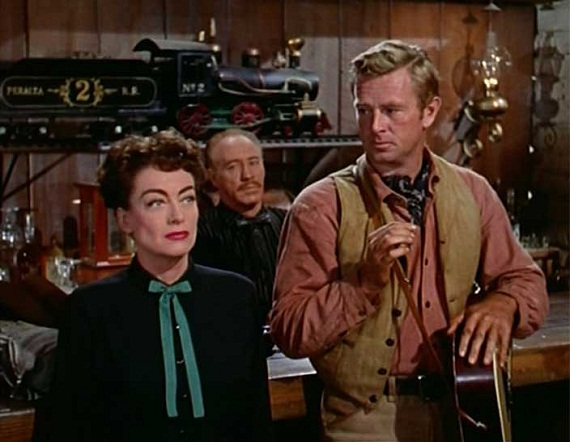
As a proto-feminist pièce de résistance Johnny Guitar stands abreast Ray’s best work. And Ray, I cannot stress enough, was cool incarnate. His hot-temper at hypocrisy, his rage at false profession and intolerance for untrue authority (neocolonialism in this case, amongst other bigotries) is on dazzling display in Johnny Guitar.
Lots of lip service has been made about how this film not so subtly assaults Joseph McCarthy’s House Un-American Activities Committee and the Hollywood blacklist, and it does so splendidly, but that is Nicholas Ray for you, now isn’t it? His subversive and counterculture inclinations (before counterculture was even perceived as such), his multi-genre mixing (probably where the French New Wave got the notion to begin with), and his outright sabotage of audience expectations is boldly emblazoned.
The way that Johnny, for instance, can pacify vicious gunmen by suggesting that “all a ‘real man’ needs: a cup of coffee and a good smoke,” is a zeitgeist defining instance if ever there was one. And that’s Johnny Guitar overall, really; a twenty-first century fever dream, governable to each generation that discovers it, tuneful yet offbeat, erratic and right, it’s sheer cinema.
Author Bio: Shane Scott-Travis is a film critic, screenwriter, comic book author/illustrator and cineaste. Currently residing in Vancouver, Canada, Shane can often be found at the cinema, the dog park, or off in a corner someplace, paraphrasing Groucho Marx. Follow Shane on Twitter @ShaneScottravis.